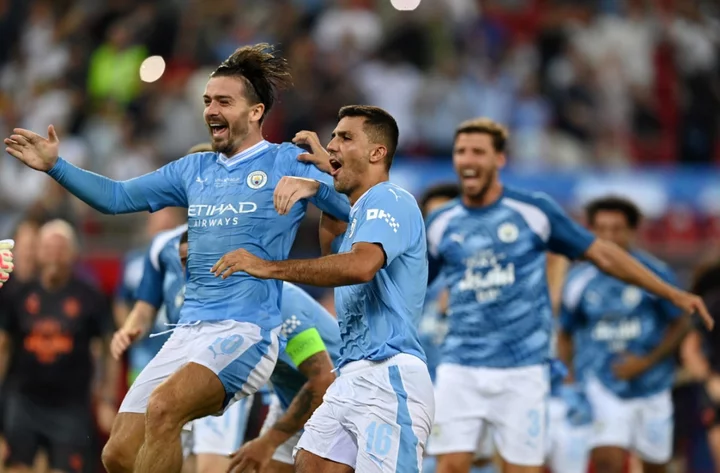
Is Man City vs Newcastle on TV? How to watch Premier League fixture
Fresh off an opening-day win over Burnley and a hard-fought midweek Super Cup triumph over Sevilla, Manchester City face an early test of their title credentials by welcoming Newcastle United to the Etihad Stadium. City were pushed all the way by Sevilla on Wednesday night before eventually winning on penalties but it was additional stress they probably could have done without and Newcastle may sense an opportunity, especially with the injuries City are facing – talisman Kevin De Bruyne set to spend months on the sidelines with a hamstring concern, while the likes of John Stones, Ruben Dias and Bernardo Silva are all either confirmed out or doubts. Meanwhile, the Magpies will be full of confidence after brilliantly beating Aston Villa 5-1 on the opening day to suggest that they’re ready to build on last season’s top-four finish. A result at the Etihad would certainly be a statement from Eddie Howe’s men but they might just fancy catching City at an opportune moment, even though they’ll be led in attack by the irrepressible Erling Haaland. Here’s everything you need to know about the fixture: When is Man City vs Newcastle? Manchester City vs Newcastle is due to kick-off at 8pm on Saturday 19 August at the Etihad Stadium in Manchester. How can I watch it? Viewers in the United Kingdom can watch the match live on TNT Sports 1 and TNT Sports Ultimate, with coverage on the channels – from which BT Sport was rebranded over the summer – from 7pm Team news Pep Guardiola has a few injury concerns as John Stones (muscle injury) and Bernardo Silva (illness) have joined now long-term absentee Kevin De Bruyne (hamstring) on the sidelines. Ruben Dias is only a “maybe” to play following last week’s concussion, although he was on the bench against Sevilla in midweek, while Julian Alvarez was “in discomfort” before that Super Cup clash and could only appear as a late substitute, although will be pushing to start. Newcastle’s injury news is ‘as you were’ with no new issues and no recoveries following their opening day thrashing of Aston Villa. That means Javier Manquillo (groin), Joe Willock (hamstring) and Emil Krafth (knee) remain unavailable. The likes of Callum Wilson, Harvey Barnes and Jacob Murphy, who all impressed off the bench against Villa, will be pushing for starts but Eddie Howe may be loathed to disrupt the rhythm of his team. Predicted line-ups Man City XI: Ederson; Walker, Akanji, Ake, Gvardiol; Rodri, Kovacic; Foden, Alvarez, Grealish; Haaland Newcastle XI: Pope; Trippier, Schar, Botman, Burn; Tonali, Guimaraes, Joelinton; Almiron, Isak, Gordon. Odds Man City win 7/10 Draw 3/1 Newcastle win 15/4 Sign up to bet365 using The Independent’s unique bonus code by clicking here Prediction A rare week where City look fallible and with Newcastle flying high, they could earn a draw at the Etihad. Man City 1-1 Newcastle Read More Super Cup is crucial to Man City’s season but it’s not about the trophy Manchester City’s Super Cup victory shows that Cole Palmer is a gem to be treasured Kevin De Bruyne facing up to four months out and may require surgery Fulham vs Brentford LIVE: Latest Premier League updates Liverpool vs AFC Bournemouth LIVE: Latest Premier League updates Wolverhampton Wanderers vs Brighton & Hove Albion LIVE: Latest Premier League updates
2023-08-19 21:15
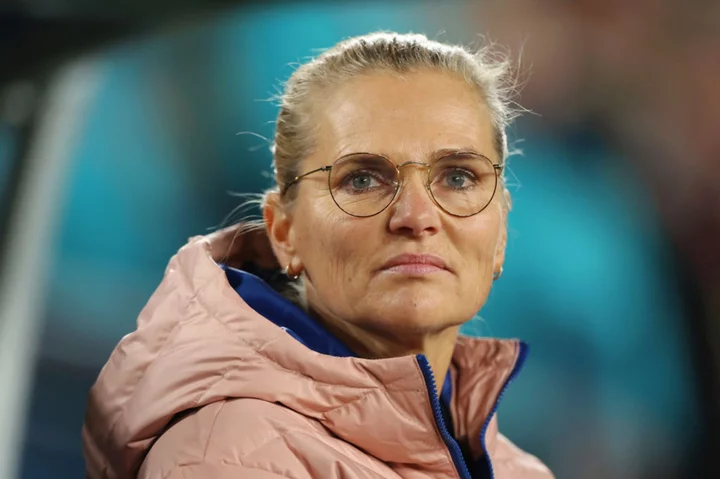
England stand on the brink of history – and a moment to change the game forever
In the final days before a World Cup final, when every touch on the training ground is charged with greater tension, it’s still difficult not to revert to the lightness of youth. That is where the very meaning of all this is first set. “When I was a kid we used to play ‘World Cup’ in the garden, where we had to score to stay in,” striker Alessia Russo smiles in England’s base. “It was having fun and playing free… as a kid growing up, to think we’re playing in a World Cup final in a couple of days is a special feeling.” It is a feeling that is universal when it comes to this game, because this game is truly unique. Nothing else comes near. It is why everyone is here. Jenni Hermoso expressed exactly the same emotions in the Spain camp. “Everything I do on the pitch I learned it on the street, playing in my neighbourhood, playing in the park underneath my grandparents’ house… of course you imagine winning, you visualise going back to Spain with the World Cup. I hope that dream becomes reality.” The manner these players inspire next generations means these simple joys should not be forgotten, as all of these players seek to do something that will be remembered forever. It is this elementary excitement that really makes such an occasion, although the 2023 World Cup final still involves a seriousness that goes beyond elite players doing what is necessary to win “the game of their careers” and Sarina Wiegman’s immense decision over Lauren James. Sunday’s match at Stadium Australia is the most meaningful fixture in women’s football history - which may sound a basic statement, but has more to it than that. It is a description that is going to be true with every World Cup final in a rapidly expanding women’s game, but feels especially important when the hosts embrace it like Australia have. Audience records have been broken. Barriers have been left far behind. This has been a truly game-changing World Cup, in so many senses. That spread of the sport has been reflected in a thrillingly unpredictable World Cup, where a later start has helped a tranche of developing football nations further bridge the gap to a more defined top level. The mismatches never happened. The tournament was instead intense from the start, characterised by upsets that became less surprising as it went on, but no less entertaining. Australia-New Zealand 2023 has had much that you would want from a World Cup: fine goals, dramatic moments, engaging matches, great storylines, all imbued with deeper themes. The most influential was probably the demise of the deposed champions, USA, that was made all the more stunning by the manner they went out. The millimetres of that penalty decision reflected the closing gaps. It all means a highly entertaining World Cup now has a fittingly high-quality final, contested by two of its finest sides; the European champions against a team driven by Barcelona’s Champions League winners. The persistence of England and Spain still fits with the trend of upsets, while explaining the wider competition. Both have overcome huge problems to be here. Spain are perhaps the most strife-torn squad to have ever made it this far in any World Cup. The feeling with England was that you can’t lose players like Leah Williamson, Beth Mead and Fran Kirby and expect to win a World Cup. Both have overcome all this because of what is maybe the single biggest factor in the women’s game now. They are two wealthy, western European countries that have industrialised talent production through infrastructure overhauls. This has been met by more investment in the women’s game than most, even if that still has some way to go. It is symbolic that both finalists have had considerable complaints related to finance, Spain with the preparation standards that were one of the reasons for a rebellion, England with an ongoing dispute over bonuses. Both echo issues throughout this tournament, from Nigeria to Australia, illustrating why Gianni Infantino shouldn’t have been as predictably self-congratulatory as he was on Friday. The Fifa president was nevertheless correct on interest in this World Cup, as the governing body for once deserve credit for their own investment. “Over a million spectators in the stadia, over one billion viewers on TV,” Infantino said. “It was a turning point for women’s football. But this World Cup here has been truly transformational, not only in Australia or New Zealand but all over the world.” He’s right. That turning point needs to keep rolling into further revolutions. Other nations need to at least aim for what England and Spain are doing. On the Stadium Australia pitch itself, their resources have created a compelling football contrast. It’s a classic case of ideology against pragmatism. Spain’s coaching culture has created what is by far the strongest and deepest football identity in the women’s game, which is why controversial coach Jorge Vilda is almost irrelevant in that regard. The passing-pressing game executed by high-quality players like Aitana Bonmati and Alexia Putellas supersedes almost everything, including most opposition. But maybe not England. The FA’s resources have instead brought the best manager in the women’s game, who has marked herself apart through the ability to adapt to virtually any situation. If the story of Spain’s run to the final has been setting aside one defining problem, the story of England’s has been solving a series of developing problems. Wiegman has responded to everything with inspiration, from injuries to the suspension of James. The team, in her own words, have “grown” through this World Cup. Wiegman now has to come up with a response to Spain in the space of just three days, since their possession will dictate the game. There is at least a lot to go off, and not just the footage her staff pored over from Wednesday night to Friday afternoon to have ready for the preparation sessions before the final. Facing the specific Spanish approach has been one of the most clearly defined tests in the sport, going back two decades in the men’s game. Managers know they will seek to dominate the ball as high up the pitch as possible. It can be exhausting. The challenge is to disrupt that while managing space and offering a threat of your own. That might actually suit Wiegman’s new 3-5-2, another mid-tournament solution. The fact so many of her attackers have come to scoring form at the right time only bolsters that, especially as Spain have a capacity for chaos in their own area. The great danger is tournament revelation Salma Paralluelo causing havoc at the other end. It remains one of the exhilarating truths of football. There is almost no defending such a rapid turn of direction. That only informs Wiegman’s huge decision on James, though. It might well be the most important decision in the history of English women’s football, given what it could mean. It’s just as well Wiegman can bear the responsibility, as she specifically spoke about the need to stop talking about 1966 and all that. She was almost totally unwilling to talk about her own personal feelings of losing the last final in 2019 with Netherlands, after all. She doesn’t think that helps anyone. The Spanish media were still too willing to compare the James decision to Jimmy Greaves. There is an obvious allure to putting such a player straight back in against a backline as open as Spain’s. That Spanish flaw may well create another historic anomaly. Having been eviscerated 4-0 by Japan, Spain could become the first team to have lost by more than two goals in a Women’s World Cup and still won it. The only previous champions to have lost at all were Japan 2011, the historic quirks only amplified by how it was England who beat them. Wiegman’s side can offer a precedent of their own, though. They would become the first world champions to have beaten someone from every confederation, truly living up to the title. Both of these teams would really be the worthiest of winners, though, and there’s one piece of history that is more important than any other. One country will win the Women’s World Cup for the first time. They’re going to find there’s nothing like it. The childhood dream is one thing. The reality is something else. It will be revealed on a charged Stadium Australia pitch on Sunday. Read More Sarina Wiegman: ‘Stop talking about the result — we know what we want’ Ella Toone or Lauren James? Sarina Wiegman has already made the biggest decision of England’s World Cup Infighting and rebellion: How Spain overcame themselves to reach edge of Women’s World Cup glory ‘Disappointing’: Prince William blasted by Lionesses fans for missing Women’s World Cup final in Australia Women’s World Cup LIVE: Sarina Wiegman says ‘everyone’s talking about 1966’ and backs England to end hurt Where to watch the Women’s World Cup final between England and Spain
2023-08-19 19:27
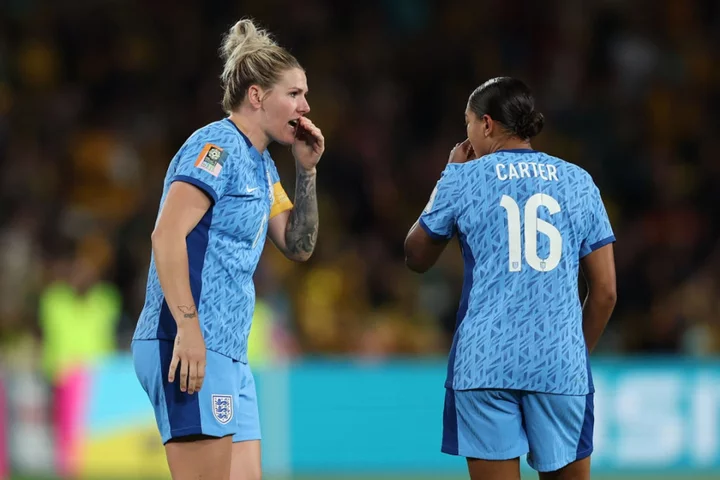
How England and Sarina Wiegman changed the World Cup and found their greatest strength
England were “struggling”. Two games into the World Cup and the final seemed a long way away. Despite the opening wins against Haiti and Denmark, England needed to change. While players and managers at major tournaments often repeat the line that results are all that matter, Sarina Wiegman was more concerned with how her side were underperforming. The Lionesses were faced with a lack of creativity, and a vulnerability to the counter-attack. But Wiegman and her coaching team had a back-up plan. A change in formation was an idea she and her staff discussed in April when they were designing a way for England to be more unpredictable at the World Cup. A 3-5-2 system was identified as a way to get more from certain players in the squad and play to their strengths, while also giving their opponents something new to think about. Still, when Wiegman was faced with the decision to rip up England’s approach and start again, she required courage and conviction to commit to it. She found it in the form of her assistant Arjan Veurink, who has been at Wiegman’s side for the past four major tournaments, previously with the Netherlands and now with England. With the injury to Keira Walsh following England’s win over Denmark, a blow that at the time appeared to rule the midfielder out of the tournament, Veurink went to Wiegman and said the time had come. “You’re completely right,” Wiegman replied. “This is the moment.” From there, the trait of England’s World Cup campaign became their adaptability, and the unsung stars became the new back three that was suddenly pulled together for the final group game against China. “The way they explained the reasons why and what they wanted to do was so easy to adapt to it,” said defender Jess Carter who, alongside captain Millie Bright and the exceptional Alex Greenwood, has been one of the revelations of England’s tournament. Carter had been dropped to the bench against Denmark and didn’t think she would play again, after arriving at the World Cup not expecting to play at all. But the 25-year-old has been ever present throughout the knockout stages at right-centre back, next to her Chelsea teammate Bright and with Greenwood on the opposite side. In England’s progress to their first World Cup final, Wiegmans’ new-found defence has emerged as its key strength, and has been the cornerstone of their resilience and mentality. There has been a balance to it, with each player in the back three complementing the other. Carter is the calm, assured defensive cover, brilliant in the one-on-ones. Bright is England’s rock, an aggressive front-foot defender who is then as dominant in the air as anyone in the world. Greenwood has arguably been England’s player of the tournament. On the left side of the three, her ability to pass through the line has allowed England to play out, while her sense to surge forward on the ball has frequently relieved pressure. It has seemed a natural connection, and how England have needed it. “It clicked really quickly,” Carter said. “Our honest communication with each other is something that’s really important. We tried to figure out really quickly what one another needed. I think we’re a very confident team and everyone’s got so many different types of experience. Seeing out games is something that is part of that experience.” In the last-16, they withstood the introduction of Nigeria’s Asisat Oshoala and then played extra time with 10 players after Lauren James’ red card. In the quarter-finals, Carter eventually restrained Colombia’s star forward Linda Caicedo, and Bright headed clear everything that was thrown into the box. Sam Kerr had her moment in the semi-finals, but England won the tactical battle against the Matildas and did not blink when the hosts equalised in Sydney. At 1-1, Carter made a crucial intervention when Cortnee Vine’s shot was saved by Mary Earps, which turned the game. But in the final, England’s back three face its biggest challenge yet. As Spain have overcome themselves to reach their first Women’s World Cup final, it was only poor finishing that resulted in their run to the final being closer than expected. They got away with it against the Netherlands in the quarter-finals, and Sweden in the semis, but Spain created high-quality chances at a far greater rate than any of the four semi-finalists. While they have a way of missing chances, Spain’s build-up through a technical midfield that has the outstanding talent of Aitana Bonmati has been intricate and precise, and often a level above what England have shown. They will also offer threats that England have yet to face at the tournament, mainly, should head coach Jorge Vilda keep the same system, a false-nine in Jenni Hermoso. In the middle of England’s back three, Bright has relished the duels with the opposite central striker and come out on top since Wiegman’s switch. Hermoso, though, is different: when Spain’s record goalscorer drops into midfield to help with their build-up play, it could drag Bright into some uncomfortable positions, or isolate England’s captain. Spain’s style also features wingers who stay high and wide and another challenge for England will be how they deal with them. It could fall to England’s wing-backs Lucy Bronze and Rachel Daly but when Spain have established possession, their full-backs Ona Batlle and Olga Carmona must also be accounted for. Meanwhile, if Carter and Greenwood are pulled away from Bright to deal with Spain’s wide threats, it only creates space for Bonmati and Alexia Putellas in the inside channels, the areas where Spain’s two stars can cause the most danger. It may be, however, that Spain’s most dangerous threat does not even start. Salma Paralluelo has come off the bench to devastating effect to score in both the quarter-finals and semi-finals, with the winner against the Netherlands and then the opener against Sweden. The 19-year-old, who was tipped to be a future Olympic sprinter before signing for Barcelona at the start of the season, has electrifying pace and has used it to blow Spain’s last two games wide open, while also providing the lethal finishing her team desperately required. If Paralluelo is kept to the bench, her arrival will signal the moment where the game changes, although England could then mirror it now Lauren James is back for suspension in time for the final. Indeed, given how both teams have reached the final, the appearance of James should worry Spain a lot more than the potential impact of Paralluelo. While England’s defence has been the backbone of their tournament, Spain can hardly say the same about theirs. While England have the pragmatic nous of European champions, Spain are likely to start with the inexperienced goalkeeper Cata Coll and centre-back Laia Codina. Both were parachuted in for the knockout stages, following Spain’s 4-0 defeat to Japan in the groups, and if they start the final, it will only be Codina’s sixth match for Spain, and Coll’s fourth. Spain have shown vulnerabilities late in games and conceded late goals against the Netherlands and Sweden, even if they ultimately recovered. With that, and in many other ways, Spain and England’s journeys to the World Cup final have shared plenty in common. But if the old adage is true that attack wins you games and defence wins you titles, then it’s an area where England have so far displayed a clear advantage. Read More How to watch England vs Spain: TV channel and kick-off time for Women’s World Cup final England stand on the brink of history — and a moment to change the game forever Sarina Wiegman: ‘Stop talking about the result — we know what we want’ Women’s football world rankings: Who could take No 1 at the World Cup? Women’s World Cup TV schedule: How to watch every match today Sarina Wiegman thankful for ‘dream’ support as World Cup final set to unite country
2023-08-19 19:17
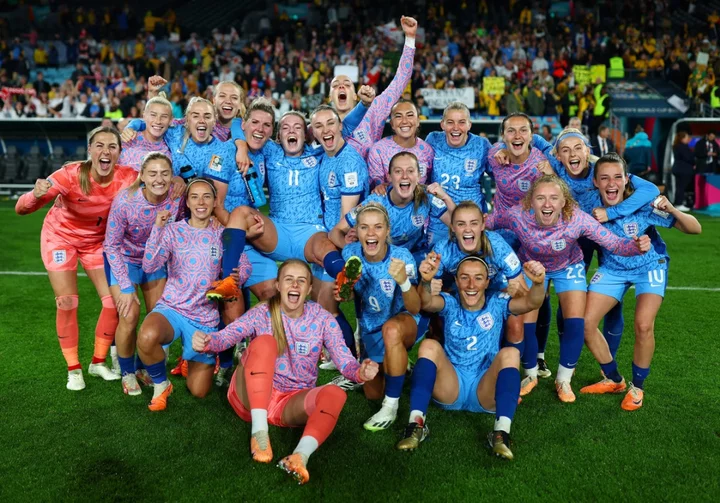
How to watch England vs Spain: TV channel and kick-off time for Women’s World Cup final
England play Spain in the Women’s World Cup final as the Lionesses look to bring home the game’s biggest prize for the first time. The nation is set to come to a halt as England play their first World Cup final, men’s or women’s, in 57 years. Manager Sarina Wiegman has urged her players to block out the “noise” of 1966 as England look to add the World Cup title to last year’s Euros triumph. The Lionesses reached the World Cup final for the first time with their 3-1 win over Australia in the semi-finals, with Wiegman’s side managing to stay cool to defeat the hosts with a clinical display in Sydney. Spain, who are also playing the first Women’s World Cup final, have navigated a player mutiny off the pitch and questions surrounding their manager Jorge Vilda, but ‘La Roja’ remain dangerous opponents and are led by their contingent of Barcelona stars. Here’s everything you need to know ahead of the World Cup final and find latest tips for the game itself here. When is England vs Spain? The Women’s World Cup final will kick off at 11:00am BST on Sunday 20 August at Stadium Australia, Sydney. What TV channel is it on? The World Cup final will be shown by both the BBC and ITV. Coverage on BBC One starts at 10am, while ITV’s coverage begins at 10:15am. It will also be available to watch online, on both the BBC iPlayer and on ITV X. What is the England team news? England have no injury concerns and the return of Lauren James means Sarina Wiegman has all 23 players available for the final. Wiegman faces a decision on whether to bring in James from the start, but is likely to stick with the team that performed so impressively against Australia. Mary Earps is a contender for the tournament’s golden glove and will start behind England’s back three of Jess Carter, Millie Bright and Alex Greenwood, with Lucy Bronze and Rachel Daly at wing-back. Should Toone start, the midfielder will play alongside Kiera Walsh and Georgia Stanway, with James remaining an excellent option to have on the bench. England’s front two of Alessia Russo and Lauren Hemp have struck up a deadly partnership and were both on target in the quarter-finals and semi-finals. Chloe Kelly will be among the other attacking options on the bench. What is the Spain team news? Spain face a big decision of their own, with Salma Paralluelo scoring in both their quarter-final win against the Netherlands and in the semi-final win against Sweden after coming off the bench. Head coach Jorge Vilda may decide to keep the 19-year-old winger as an impact substitute, with Alexia Putellas set to remain in the starting line-up even though she is yet to come to life at the tournament. Predicted line-ups Spain: Coll; Batlle, Parades, Codina, Carmona; Teresa, Bonmati, Putellas; Caldentey, Hermoso, Redondo England: Earps; Carter, Bright, Greenwood; Bronze, Stanway, Walsh, Daly; Toone; Hemp, Russo Read More England stand on the brink of history — and a moment to change the game forever Ella Toone or Lauren James? Sarina Wiegman has already made the biggest decision of England’s World Cup Infighting and rebellion: How Spain overcame themselves to reach edge of Women’s World Cup glory
2023-08-19 18:55
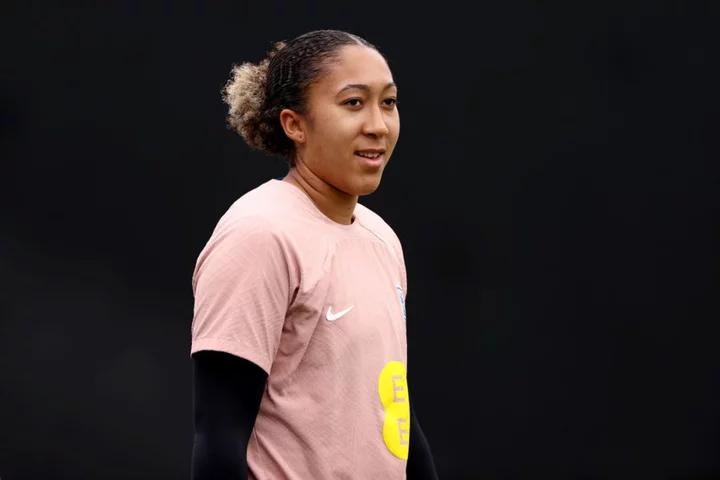
England vs Spain predicted line-ups: Team news ahead of Women’s World Cup final
Sarina Wiegman has a big decision to make as England face Spain in the Women’s World Cup final and the Lionesses look to win the game’s biggest prize for the first time. After successfully ending their run of semi-final defeats to beat hosts Australia in Sydney, Wiegman must decide whether she will bring star forward Lauren James back into her starting line-up for the final. James was sent off for stamping on an opponent in England’s last-16 win over Nigeria but has now served her two-match suspension is available to play in the final. England’s Ella Toone impressed with her performance against Australia and was also on the scoresheet as she scored the opening goal, so the Manchester United midfielder will be difficult to drop. But James was one of the players of the World Cup during the group stages, scoring three goals, and could be the difference for England as they look to win the World Cup for the first time. Here’s everything you need to know ahead of the World Cup final and find latest tips for the game itself here. When is England vs Spain? The Women’s World Cup final will kick off at 11:00am BST on Sunday 20 August at Stadium Australia, Sydney. What TV channel is it on? The World Cup final will be shown by both the BBC and ITV. Coverage on BBC One starts at 10am, while ITV’s coverage begins at 10:15am. It will also be available to watch online, on both the BBC iPlayer and on ITV X. What is the England team news? England have no injury concerns and the return of Lauren James means Sarina Wiegman has all 23 players available for the final. Wiegman faces a decision on whether to bring in James from the start, but is likely to stick with the team that performed so impressively against Australia. Mary Earps is a contender for the tournament’s golden glove and will start behind England’s back three of Jess Carter, Millie Bright and Alex Greenwood, with Lucy Bronze and Rachel Daly at wing-back. Should Ella Toone start, the midfielder will play alongside Kiera Walsh and Georgia Stanway, with James remaining an excellent option to have on the bench. England’s front two of Alessia Russo and Lauren Hemp have struck up a deadly partnership and were both on target in the quarter-finals and semi-finals. Chloe Kelly will be among the other attacking options on the bench. What is the Spain team news? Spain face a big decision of their own, with Salma Paralluelo scoring in both their quarter-final win against the Netherlands and in the semi-final win against Sweden after coming off the bench. Head coach Jorge Vilda may decide to keep the 19-year-old winger as an impact substitute, with Alexia Putellas set to remain in the starting line-up even though she is yet to come to life at the tournament. Predicted line-ups Spain: Coll; Batlle, Parades, Codina, Carmona; Teresa, Bonmati, Putellas; Caldentey, Hermoso, Redondo England: Earps; Carter, Bright, Greenwood; Bronze, Stanway, Walsh, Daly; Toone; Hemp, Russo Read More England stand on the brink of history — and a moment to change the game forever Ella Toone or Lauren James? Sarina Wiegman has already made the biggest decision of England’s World Cup Infighting and rebellion: How Spain overcame themselves to reach edge of Women’s World Cup glory Women’s World Cup TV schedule: How to watch every match today Sarina Wiegman thankful for ‘dream’ support as World Cup final set to unite country England vs Spain: Kick-off time and how to watch World Cup final on TV
2023-08-19 18:46
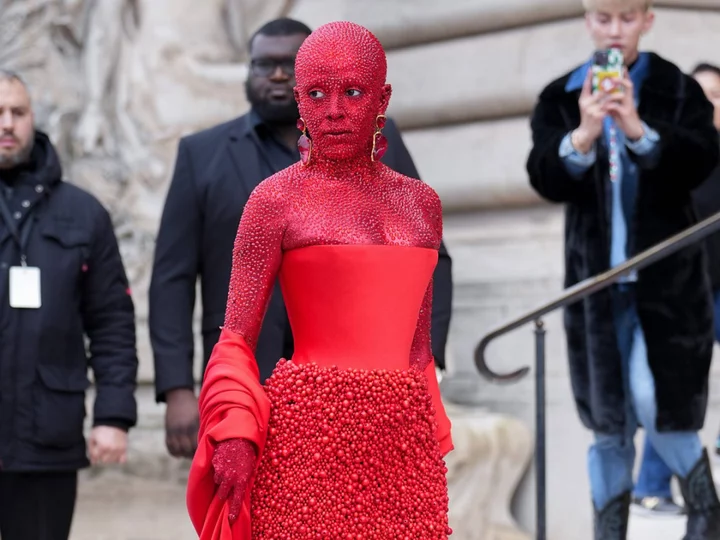
Doja Cat acknowledges fan backlash to her style evolution
Doja Cat recently acknowledged the intense fan backlash to her fashion evolution in an interview with Harper’s Bazaar. The Grammy winner has been contending with her fanbase for the past month, taking aim at some fans for naming themselves “Kittenz”, leading to a mass exodus of 250,000 followers on Instagram. However, the “Kiss Me More” singer is unfazed by the actions of certain circles of her fanbase, writing on her Instagram Story: “I feel free.” In the Harper’s Bazaar interview, conducted by rap-radio legend Angie Martinez, Doja Cat theorised that because a lot of fans believe they can “take ownership” over the artists they worship, the artists themselves are “not real to them.” She has decided to rebel against this dynamic, culminating in the mass unfollowing of half a million followers. Still, the unfollowing hasn’t put a dent in the rapper’s social media account, which still boasts over 25m followers, according to Social Blade. Despite her harsh words, she expressed gratitude for the fans who have “stood up for [her] or other people” amidst the backlash. Ever since she drastically changed her look by shaving her head and eyebrows, the “Vegas” rapper has been relentlessly attacked by online trolls. Doja Cat - whose real name is Amala Ratna Zandile Dlamini - said that she “really appreciates” the fans who go out of their way to “speak up for someone who is getting bullied,” calling these “some of the most moving moments” she’s experienced as a mainstream artist. She also admitted that her change in style has been a whiplash for her fans, especially for those who feel a sense of “ownership” over her. “There is a shock response that is almost uncontrollable,” Doja Cat said. “I’ve accepted that that’s what happens. So I put my wigs on and take them off. I shave my head or my eyebrows. I have all the freedom in the world.” While Doja Cat noted that she’s in a “kind of chaotic place” when it comes to her sense of style and taste in fashion, she said that she views it as a part of the process of coming into her own. For her, it’s all a product of being in an era of self-discovery. “I’ve just been going into my closet and picking out the most random, weird, not-fitting thing to mix with another thing that does not really fit,” the pop star said. “It’s like mashed potatoes. But I’m embracing that. It’s a little punk. It’s experimental for sure. It’s very manic. But I am going in a darker direction when it comes to visuals and fashion. I have a lot of pent-up feelings and anger, and I want to express it with beauty. I’ve been playing with a lot of prosthetics lately.” Most recently, the pop star wore prosthetics to the 2023 Met Gala honuoring the late Karl Lagerfeld. Her makeup artists used prosthetics to realise her vision of looking like a “humanoid cat” as a nod to the late designer’s beloved feline, Choupette. Her Met Gala look was among many that have pushed boundaries, another being her head-to-toe red paint look, adorned with 30,000 crystals, for Schiaperelli’s haute couture show in Paris last January. Doja Cat also reflected on how her style experimentation has come at a time when she feels more grounded, as part of her overall journey of “learning to love” herself more. “I feel like a woman who is coming into her own,” she said. Read More Doja Cat says she feels ‘free’ since losing Instagram followers over fan controversy Doja Cat says fans feel like they have ‘ownership’ of her: ‘Subconsciously, I’m not real to them’ Doja Cat fans deactivate Twitter after singer hits out at ‘Kittenz’ fan name
2023-08-19 18:45
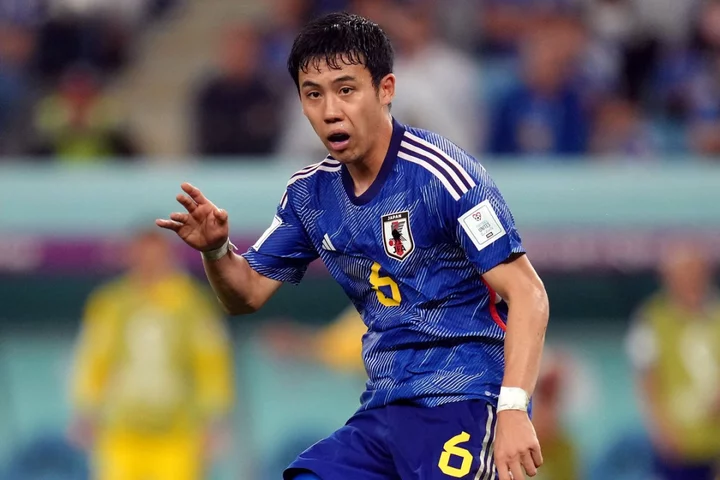
New signing Wataru Endo compared to ‘one of the biggest Liverpool legends’ by Jurgen Klopp
Instead of the third most expensive footballer in history, Liverpool have unveiled the third most expensive midfielder they have signed this summer and the third they targeted in swift succession. A dizzying week that began with a British record bid for Moises Caicedo ended with Romeo Lavia joining the Ecuadorian at Stamford Bridge and the arrival of Wataru Endo at Anfield, almost £100m cheaper than one of the men who preferred Chelsea to Liverpool and seemingly out of the blue. This, Jurgen Klopp accepted, was not how many supporters hoped their search for a No 6 would go. “It is a transfer that is not in the public eye,” he said. “It’s not ‘Oh my God!’ and probably nobody at this moment is texting a new song for him.” That said, though, Klopp did get a text from an influential figure in German football, congratulating him on the signing of the former VfB Stuttgart captain. If Caicedo can be billed as the new N’Golo Kante, and not merely because of the Ecuadorian’s choice of club, Klopp looked into Liverpool’s recent past for a comparison for his latest buy. He settled on perhaps the most unglamorous figure of their recent glory years, James Milner. He urged fans to look beyond the bare facts about Endo – a 30-year-old relegation firefighter in the Bundesliga – and embrace an unlikely addition. “I know how football fans are, they would prefer to bring in a player who is £110m,” he said. Normally when a manager pleads that a player should not be judged on his price tag, it is because he is costly, not cheap. “But wait: he has something that Liverpool supporters will love, definitely,” added Klopp. “He is already used to red a little bit [from Stuttgart], so that’s good, and when he puts that shirt on he will throw everything on the pitch and the people will love that, I know that. We had this with James Milner a little bit. Obviously a slightly different profile but could you respect James Milner more for playing 15 minutes at the end and just closing a game down?” Milner, Klopp added, was “one of the biggest Liverpool legends of my time and arrived here he was 29”. The German came to Anfield a few months later and since then he had only signed one outfield player in their thirties: defender Ragnar Klavan in 2016, also from a bottom-half Bundesliga club. But if Klopp has to convince the Anfield public Endo is not too near the end, he also had to persuade his employers. “The way our owners see it he was already too old when he joined Stuttgart,” he said. “The owners really want 200 games at 20 years old. That is pretty difficult. I didn’t need any kind of convincing. I know that the best time for a football player is from 27 to 33 in a normal career.” If Alexis Mac Allister and Dominik Szoboszlai conform to the usual model for Liverpool signings in the Fenway Sports Group era, Endo is an anomaly. His new manager’s view is that the Japan captain is a young 30. “When you see him, you think ‘is he allowed to drive a car?’” Klopp asked. Certainly, a four-year contract reflects Liverpool’s belief that, like Milner before him, Endo will retain his running power deep into his thirties. His age, he feels, is a reason his new recruit was overlooked; why he is the exception to FSG’s rule. “He is a late bloomer and he improved every year since he was on the proper football screen,” he said. Klopp has always savoured an underdog tale; for him, there is much to enjoy in the way Endo took a long and winding road to Liverpool, via Shonan Bellmare, Urawa Red Diamonds, Sint-Truiden and then Stuttgart. “I am really happy these kind of stories are still possible in this crazy world of football,” he said. “It feels just right.” And Liverpool definitely feels right for Endo. “A dream come true,” said a player for whom such a move would long have seemed utterly unrealistic. After Caicedo and Lavia showed rather less enthusiasm to sign, Klopp grinned as he stressed Liverpool finally reached an agreement with “the club and the player”. There can be no pretence Endo was Liverpool’s first choice but he sought to address the perception that desperation ruled. “He was on my list from the beginning,” he said. He had watched Endo since he joined Stuttgart in 2019. He moved for him after Liverpool had just 35 per cent possession against Chelsea – “crazy,” Klopp said – when, in the absence of a specialist defensive midfielder, Mac Allister had to impersonate one. But it was such a shock that even Endo pronounced himself surprised. He is the £15m man, not the £115m midfielder. “But in the end the pitch is the same size,” Klopp said. “The player will not grow with the money he costs, it’s rather the other way around.” But even Endo has grown into a Liverpool player late in his career, Klopp is hoping he has a Milner-esque impact for a price a fraction of Caicedo’s. Read More Wataru Endo: Liverpool strengthen midfield by signing Bundesliga ‘machine’ Moises Caicedo completes Chelsea’s dream midfield — but £115m deal could haunt them Chelsea and Liverpool serve up entertaining glimpse of football without defensive midfielders
2023-08-19 13:28
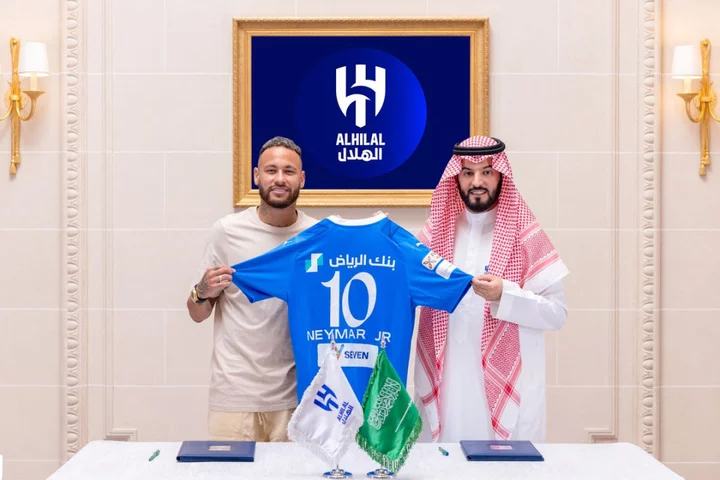
Farewell to Neymar, a European career played out in Lionel Messi’s shadow
Farewell, then, Neymar. He is only 31, but his choice to leave Paris Saint-Germain and join Saudi “giants” (his word) Al-Hilal – eight months after what was likely his last shot at winning the World Cup – feels like the beginning of the end for Neymar at the top of the game. It has, for the most part, been a joy. “He makes football a pleasure,” once said Pep Guardiola. Neymar would choose to dribble into a maze of defenders rather than play a simple pass, but invariably he would come out with the ball at his feet. His highlights reel is full of jinking runs and cheeky nutmegs, most of which lead to little, and often his skills seem pointless, like controlling a high ball wth a Cruyff-turn. But then what is pleasure if not acting without necessity, just for the fun of it? He has won almost everything – multiple league and cup titles, the Champions League, the Club World Cup and the Olympic Games – and yet looks set to end his career without the World Cup his nation expected or the Ballon d’Or his talent merited (he twice finished third). It would be easy to conclude that Neymar lacked application, particularly at PSG. His appearance record – never playing more than 22 games in a single season for the club – hints at a deeper malaise beyond the recurring injuries that dogged his time in Paris. PSG fans grew weary of Neymar, while his support for Brazilian far-right president Jair Bolsonaro made him even easier to dislike. But no one can ever say he didn’t care about football. Neymar wept in the dressing room before his final game for Santos. He wept when PSG lost the 2020 Champions League final to Bayern Munich in Lisbon. He wept on Lionel Messi’s shoulder after losing the 2021 Copa America final to Argentina. He wept when Croatia came back to win on penalties in Qatar. Expectation was the constant background noise to Neymar’s career, and the pain of defeat was visceral. His decade in Europe was played mostly in his friend Messi’s shadow. The only player on the planet better than Neymar in every facet of the game was on the pitch for most of his 359 matches for Barcelona and PSG. It must have been frustrating at times that his greatest accomplice was also a source of shade, even if they formed one of the greatest teams of all time – Barcelona’s treble-winning 2014-15 side – with that fantasy front three with Luis Suarez. They played with joy, and Neymar was the epitome of that. Like his club career, Neymar’s international legacy is framed by Messi. The 2021 Copa America final between Argentina and Brazil was billed as a fight between the countries’ two talismen, each with a chance to finally unload the burden they had carried for so long. Neither played particularly well that night in the Maracana, but it was Messi who celebrated and Neymar who needed consoling. Qatar 2022 was Neymar’s best chance to win the World Cup. He had sat in the stands injured watching Brazil lose 7-1 to Germany in the Maracana in 2014; he was powerless to stop a brilliant Belgium win in the quarter-finals at Russia in 2018. But Brazil arrived in Qatar as the pre-tournament favourites, ready to finally deliver on his destiny. So when he scored that mesmerising goal against Croatia in extra time of the quarter-final, weaving through an entire defence from a standing start to finally break the deadlock, if felt like that would be the goal to define his career, the one shown on repeat when future generations looked back at Brazil’s 2022 World Cup triumph. Instead Croatia came back and it was Messi’s goal a few days later that provided the tournament’s iconic moment, and Messi’s destiny which was fulfilled. That felt like Neymar’s last shot at the Ballon d’Or, which usually requires a Champions League or World Cup to convince its audience. And perhaps his move to Saudi is a tacit submission of sorts, a white flag in his long battle to transcend the Messi effect. The Independent has reported how Neymar tried to force a move to a Champions League club this summer, but couldn’t find a suitor. The footballing world stopped believing he could transform the most important games and the offers dried up. Instead he has accepted eye-watering paycheque along with his personal demands for three supercars, a 25-bedroom mansion, a very specifically sized swimming pool and a fridge permanently full of acai juice – the man loves his acai. And there is something ironic in Neymar leaving behind the giant profiles of Messi and Kylian Mbappe only to join Al-Hilal, a team with Cristiano Ronaldo. Perhaps he will be back in Europe before long. Perhaps the 2026 World Cup is still a realistic target – one last shot at winning the trophy he most craves, because really what can anyone possibly say once you’ve won that? But more realistic is that his move to Saudi Arabia erodes his already blunt edges, that other players overtake him in Brazil’s pecking order, that the European game moves on. His most famous goal remains one he scored aged 19 for Santos, which came after a dribble of unfathomable balance and control that requires rewinding like a magic trick. And perhaps, looking back, he could never have met the expectations he unknowingly set in that moment. Perhaps he did everything he possibly could have in the era of Messi. Read More Watch as PSG manager Luis Enrique holds press conference after Neymar departure Neymar departs PSG to become latest star signing for Saudi Pro League side Shots fired from Australia batter David Warner – Tuesday’s sporting social Neymar agrees Saudi move after only one European club showed interest Football rumours: Manchester United weighing up approach for Amadou Onana Kylian Mbappe set to return to PSG squad after ‘positive discussions’ – reports
2023-08-18 23:50
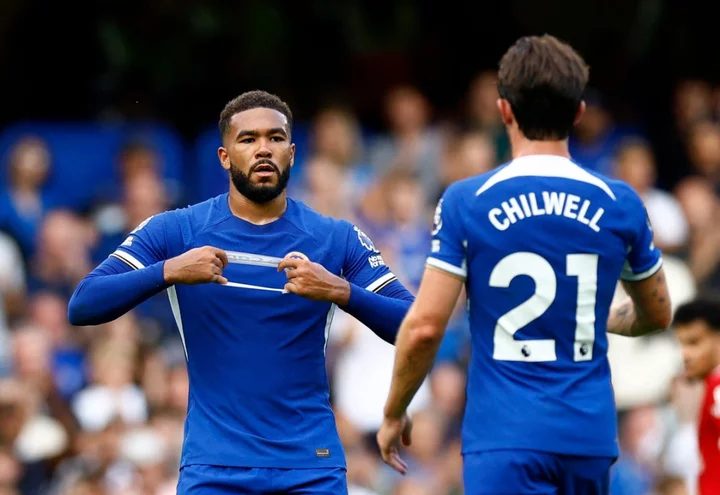
Reece James injury: Chelsea captain expected to be out for weeks with hamstring strain
Reece James has been ruled out of Chelsea’s weekend visit to West Ham and could face several weeks on the sidelines after sustaining a hamstring injury in training. James, 23, was made club captain by new manager Mauricio Pochettino in the summer, but his first game leading the side ended early when he was replaced in the second half of the 1-1 draw with Liverpool. Aftewards Pochettino insisted James was suffering only from fatigue and would be fit for the Blues’ visit to the London Stadium. But the defender has now picked up a muscle strain that adds to his long line of injuries disrupting his progress at Stamford Bridge. A statement said: “Reece James is starting rehabilitation having undergone assessments on an injury sustained in training this week.” Meanwhile, Chelsea have completed the signing of 19-year-old defensive midfielder Romeo Lavia from Southampton on Friday after agreeing to a reported transfer fee of £58m. The Belgium international signed a seven-year deal after reportedly rejecting a proposed move to Liverpool. The spending spree at Stamford Bridge continues with Lavia arriving just days after Chelsea signed Ecuador midfielder Moises Caicedo from Brighton for £115m. Caicedo's signing took Chelsea's spending on players to almost £1bn in 15 months under its new American owners. The highly rated Lavia has played only 29 times in the Premier League. “I’m really happy to join Chelsea and be a part of this exciting project,” Lavia said in Chelsea’s announcement. “It’s an amazing football club with a great history and I’m really excited to get started. I can’t wait to meet all my new teammates and build a chemistry together to achieve great things together.”
2023-08-18 19:53
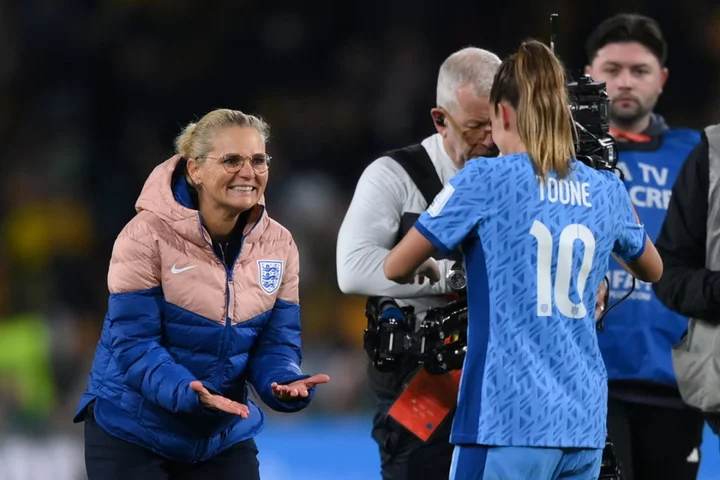
Sarina Wiegman commits future to England after USA speculation
Sarina Wiegman is happy as England manager and wants to see out the remainder of her contract, despite speculation linking the Lionesses boss to the United States. Wiegman, who will lead England into their first Women’s World Cup final against Spain on Sunday, is set to attract interest from the USA after the resignation of head coach Vlatko Andonovski - following their huge underperformance and last-16 exit at the tournament. The Dutch manager has an outstanding track record and is the first head coach to reach the Women’s World Cup final with two different teams, after guiding her native Netherlands to the final in 2019. Wiegman also ended England’s 56-year wait for a major trophy when the Lionesses won the Euros last summer, with the Dutch also winning the European championships on home soil in 2017. The FA said on Thursday that they would “100 per cent” reject any approach for Wiegman before the end of her contract, which is through to the end of the Euros in 2025, and the 53-year-old confirmed she would not consider any offers after the World Cup. “I’m really enjoying my job and I have the impression that people still like me doing that job,” Wiegman said on Friday. “I have no plans to leave.” When asked about the open position with the USA, the four-time World Cup champions, Wiegman replied: “I’ve heard [about] it. I’m with England, I’m really happy with England and I have a contract until 2025.” While Wiegman is preparing for Sunday’s World Cup final against Spain in Sydney, there is also the potential that the 53-year-old takes charge of a Great Britain team at the Paris Olympics next summer, ahead of the defence of England’s European title in 2025. Wiegman, meanwhile, would not comment on the pay gap that exists between herself and male counterpart Gareth Southgate, the manager of the men’s team. While Wiegman’s annual salary is £400,000, men’s boss Southgate is reportedly paid £5m a year. “Well, first of all I think I feel very comfortable with where I am right now,” Wiegman said. “The FA treats me very well. And that’s the only thing I want to say about that now because I’m really focused on the game.” Read More Women’s World Cup LIVE: Sarina Wiegman says ‘everyone’s talking about 1966’ and backs England to end 57 years of hurt Sarina Wiegman: ‘Stop talking about the result — we know what we want’ Ella Toone or Lauren James? Sarina Wiegman has already made the biggest decision of England’s World Cup
2023-08-18 19:22
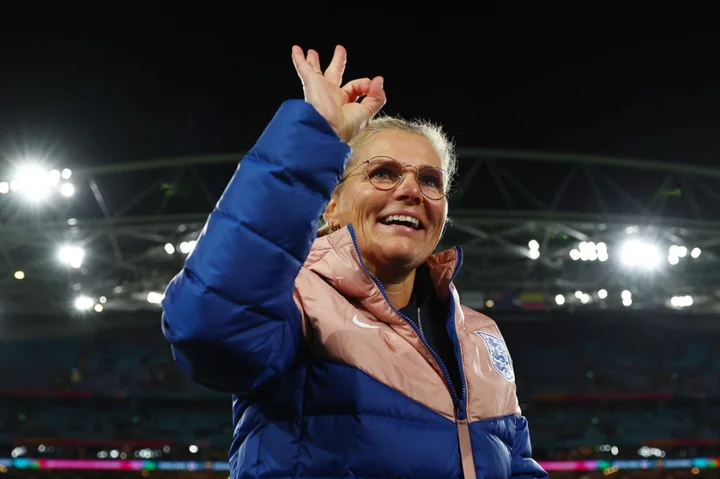
Sarina Wiegman: ‘Stop talking about the result — we know what we want’
When it gets to this stage before a big game, even someone as experienced as Sarina Wiegman finds she can’t take her mind off it. Or, rather, she doesn’t want to take her mind off it, which is precisely why she’s so experienced. “No, and I don’t want to relax,” she smiles. “It’s Spain,” Wiegman says of her thoughts before taking on Sunday’s opponents. “Everything now is Spain. When you’re so close, well, I have that feeling a little bit anyway, but when you go to the next game, you’re only thinking ‘OK, what’s next? What can we get in front of us? What challenges can we expect? How are we going to prepare the team? “I just want to get ready.” Wiegman has ensured England have never been more ready. The national team are on the brink of bringing a decade-long project to glorious completion and winning a first ever Women’s World Cup because of her crucial influence. The 53-year-old from The Hague can now be classed as the best manager in the game. While the key elements of that story are tactics, patience, strategy and the will – as well as investment from the FA – to hire a manager this good, there is also something acutely personal. Wiegman can talk with authority about the rarefied build-up to such games because this is her fourth major international final, and her second World Cup final. It may also be her first World Cup final win. She has already got so close with the country that means the most to her, having narrowly lost 2-0 with the Netherlands to the USA in Lyon four years ago. Something has changed for Wiegman since then, though. England has changed her, even if her effect on the national team has been far greater. The manner in which Wiegman quickly moves on from questions about herself to talking about the collective is fairly typical, especially in the days before a game. She tends to be much more expansive after a match, and the belief from those who know her is that it’s not just about ultra-focus. It’s also about giving absolutely nothing away to the opposition. She is that guarded when it comes to the game. One of the more surprising elements of a sit-down with Wiegman at England’s Terrigal base, so close to the biggest fixture in sport, is how relaxed she is and how willing she is to get into the personal. There is constant laughter – especially as she elaborates on Dutch directness against English politeness – but also a moment of poignancy as she discusses the various challenges she and the team have faced. The injuries are only a small part. Of true significance is her ongoing adjustment to life without her sister, who tragically passed away shortly before the Euro 2022 campaign. “I’m a pretty positive person but of course I also have feelings,” Wiegman says. “I feel very privileged to work with this team. It has been so great. You have some setbacks with some players that got injured, which was very sad for them, but then you have to switch and say: ‘OK, this is the group of players we think are the best and this is the team now. We are going to go to the World Cup with them.’ “Then of course there are still things in my personal life. When someone passes away who is really close to you, you don’t just say: ‘Oh, it’s two months now, it’s gone.’ I have strategies but of course sometimes that’s still sad and it is challenging for me too.” It was Wiegman’s human nature, as much as her managerial insight, which was why the Football Association were so willing to wait for her in September 2021. So many of the other pieces were already in place, not least a brilliant generation of players. That came from a coaching revolution, and huge investment in the wider game. It just needed, in the words of chief executive Mark Bullingham and women’s technical director Kay Cossington, someone to bring it all together. “She’s created a really strong culture,” Bullingham says. “You can see what she brings in camp in terms of the togetherness. You can see how she galvanises anything, the fact there was a strong plan in place already just means it’s come to fruition really nicely.” That does make it sound much easier than it was, which is admittedly how Wiegman makes it look, certainly at Euro 2022. Even to get there, she had to work around English football culture as much as with her squad. So much of that still centres on 1966, that long wait, that block. “I know it’s there,” she says. “When we started working, September 2021, I felt that the country was so desperate to win a final in a tournament. Everyone was saying that and the players too. I thought: ‘It’s very real’.” She felt it was having an effect, so had to work against it. “If you want to win it too much… so what do we have to do? What do we have to do to win, and how can we win? To get results, stop talking about the result because we know what we want. I heard again: 1966. Everyone’s talking about 1966. So let’s be at our best on Sunday and try be successful.” While she insists she gets “out of the noise”, she is clearly animated by this topic, as she immediately apologises for interrupting another question to go straight back to it. “Another thing: football is so big in England. It’s so in the culture. That’s incredible to experience. It’s so big. It’s everywhere. That’s pretty cool, too.” The way Wiegman speaks about this gives an insight into how she works. She doesn’t view it as a profound issue of national identity. She views it as just another problem to solve. That has been the story of her time in the job and, especially, this campaign. Runs like Euro 2022 and this World Cup don’t just come from placing someone like this in a job, after all. It requires proper impact on the training ground. Wiegman found this very quickly with how she figured out the team before Euro 2022, and it admittedly did help that almost everything seemed to go for England in that tournament - not least home advantage. This World Cup has been the exact opposite. Almost everything has gone against them, right down to the crowd in repeated games, above all that semi-final against Australia. Every test has just given Wiegman and her team something new, though, particularly England’s 3-5-2 formation. The biggest test was clearly the loss of three key Euro 2022 players in Leah Williamson, Fran Kirby and Beth Mead, with Lauren James’ suspension from the last 16 only compounding that. As tends to be the case with Wiegman, she and her staff had already anticipated some of the problems. As has tended to be the case with this World Cup, though, there were still more issues. One was how constricted the team looked in those opening 1-0 wins against Haiti and then Denmark. “During the tournament in the first two matches we were struggling a little bit and we had moments where we played really well but we also had moments where we were a little bit vulnerable. So, after the second match, Arjan [Veurink, assistant manager] came to me and said: ‘Sarina, let’s sit down, isn’t this the time to go to 3-5-2?’ “I said: ‘You’re completely right, this is the moment’. With how the squad is built, and the players available, we can get more from the players and their strengths in this shape. So then we changed it.” Tactical insight alone only goes so far, though. Maximising it depends on communication, and understanding. This is another of Wiegman’s qualities. The players feel she is very straight with them. Some of this might touch on her own thoughts about English politeness against Dutch directness. She feels she now understands her adopted country much more. “I tried to learn a little bit more about the English,” she says. “The sayings sometimes are a problem, so I’m trying to learn a little bit more. I do think I understand the people a bit more but English people are very polite and sometimes you go ‘OK, are you now being polite or are you really saying what you mean? “And that’s sometimes finding a balance, because you don’t have to be rude to be direct, so I ask the players and the staff: ‘You can be honest’. It doesn’t mean that you’re rude. Just be direct.” Dutch, in other words? “Yeah,” she laughs. “Dutch, but direct doesn’t mean rude. You can just say what you think and still be very respectful.” It’s why you can take her at face value when she says she isn’t considering any overtures from the United States. Wiegman of course doesn’t actually want to be discussing any of this now, and not just for reasons of diplomacy. “We are in the final, but everything now, all my thinking, is how do we beat Spain.” It’s an insight into why she’s there in the first place. Read More Sarina Wiegman commits future to England after USA speculation England’s deadly duo have already provided the answer to the Lauren James debate What time is the World Cup final on Sunday and who will England play? Sarina Wiegman v Jorge Vilda – a look at the World Cup final coaches Eddie Howe wishes ‘remarkable’ England well in World Cup final Sarina Wiegman clarifies England future after USA speculation
2023-08-18 19:22
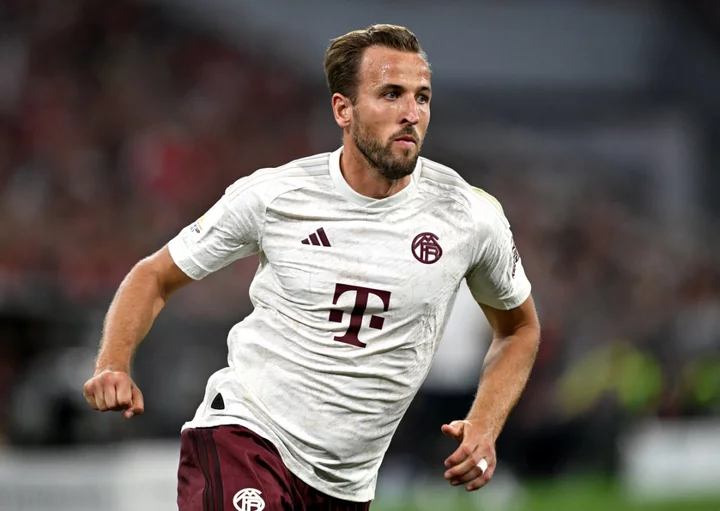
Harry Kane is Bundesliga’s greatest weapon in battle for eyeballs
“It is definitely not going to stay stuck in my head,” said Jamal Musiala, but it will probably remain lodged in the minds of many in the Dortmund area. It was the late goal the 20-year-old scored at Koln on the last day of the season, meaning Bayern Munich won their 11th consecutive Bundesliga. By default, perhaps, given that Borussia Dortmund spurned a golden chance to end the longest spell of domination in the Bundesliga’s 60-year history, missing a penalty and going 2-0 down at home to Mainz. An eventual 2-2 draw left Dortmund in their familiar role: in seven of those 11 seasons, they have finished runners-up to Bayern. Summer in Germany has been shaped by a trio who could have been England teammates: Musiala, the Stuttgart-born, Whitgift School-educated prodigy who chose to play for Germany; Jude Bellingham, the Bundesliga’s reigning Player of the Year but whose knee injury left him an unused substitute in Dortmund’s final-day heartbreak and who then decamped for Real Madrid; and Harry Kane, the £100m man who is the most expensive signing in the division’s history. There is a temptation to brand it as the biggest in years, too, though in reality last summer Sadio Mane joined Bayern, a few months before finishing as the runner-up in the Ballon d’Or and from a club, in Liverpool, at a rather higher ebb than Tottenham are now. Yet the England captaincy confers status and, while the Bundesliga has proven itself as a finishing school for young British talents, most notably Bellingham and Sancho, the 30-year-old Kane arrives at the peak of his powers. He draws attention to a division that can be both admired for its principles and feel overlooked in the battle for global television ratings. His league debut, at Werder Bremen on Friday, is the biggest game in world football at the time: his home bow, against Augsburg on Sunday week, clashes with Newcastle against Liverpool, plus Barcelona’s trip to Villarreal. Viewing figures for each may be instructive. “Harry Kane will not only strengthen FC Bayern but also be a real asset to the entire Bundesliga,” said Bayern president Herbert Hainer. Arguably, however, there is a contradiction there: Kane makes Bayern likelier Champions League winners but while the Bundesliga has had competitiveness and social mobility in most other sections of the table, not at the top; until last season, anyway, and Kane could reassert Bayern’s superiority. Only goal difference separated them and Dortmund in May, but seven of the Bavarians’ 11 titles have come by at least 10 points, two by more than 20, and the transfers of two Englishmen could shift the balance of power emphatically in their direction. Certainly, there are reasons to believe last season was Dortmund’s big chance: when Bayern had lost Robert Lewandowski when Mane’s move didn’t work out, when Julian Nagelsmann was sacked, when Thomas Tuchel got worse results than his predecessor. But the former Dortmund coach Tuchel provides one of the subplots this season: given more power on Sabener Strasse after chief executive Oliver Kahn and sporting director Hasan Salihamidzic were fired, the Anglophile manager tried to sign everyone from Declan Rice to Kyle Walker. A bid for Kepa Arrizabalaga, a goalkeeper he benched at Chelsea, failed, leaving Bayern looking for a deputy for the still-injured Manuel Neuer. In Kim Min-jae, however, he has a high-class recruit in the middle of the defence and with Kane, a conventional No 9, the side is otherwise strengthened (the post-Lewandowski void was not just felt at Bayern: the Pole had been the division’s top scorer with 35 in his final season whereas last year, for the first time in Bundesliga history, no one got more than 16). Yet Tuchel has underachieved so far and Bayern can be a febrile, political club. Dortmund, meanwhile, showed great unity after crushing disappointment. Edin Terzic, the coach and lifelong fan, was tearful after the failure to beat Mainz. The process of replacing Bellingham has started with the signings of midfielders Felix Nmecha and Marcel Sabitzer, the latter from Bayern; the trade between them has continued with Raphael Guerreiro going in the other direction. Dortmund have grounds for optimism in their vastly superior form after the World Cup, when they won 15 and lost just one of 19 games, and in the prospect of what Sebastien Haller and Karim Adeyemi might do: neither scored a league goal before the World Cup last season, when the striker was recovering from testicular cancer and the winger made a slow start, but each is a match-winner. RB Leipzig condemned Kane to an unhappy start by beating Bayern 3-0 in the Super Cup. It amounted to an eloquent response to the loss of their four best players, in Josko Gvardiol, Dominik Szoboszlai, Christopher Nkunku and Bayern’s new recruit Konrad Laimer. The hugely gifted loanee from Paris Saint-Germain, Xavi Simons, and the RB Salzburg striker Benjamin Sesko look like the pick of their signings but logically Marco Rose’s team are weaker now. The Bundesliga may have a big three of sorts now, but that offers others the chance to play Champions League football. Union Berlin’s swift rise was capped by their fourth-place finish last season; Brenden Aaronson and Robin Gosens are among their summer additions. Freiburg and Eintracht Frankfurt, two who have shown their competitiveness on the European stage in the last two seasons, are contenders to break into the top four. So are Bayer Leverkusen, joined by Granit Xhaka and led by Xabi Alonso, who could further the Bundesliga’s reputation as a breeding ground for coaching as well as playing talent. Intrigue is offered, too, by Heidenheim, promoted to the Bundesliga for the first time in their history and from a town of fewer than 50,000 people; there is room for each one and more in the grounds of five second-flight clubs, in Schalke, Hamburg, Fortuna Dusseldorf, Nurnberg and Kaiserslautern. With Barcelona’s Nou Camp and Real Madrid’s Santiago Bernabeu undergoing works, Dortmund should have the biggest gates on the continent this season. The vast capacities of its grounds facilitate lower ticket prices and add to the popularity of German football: the Bundesliga’s average attendance last season, of 42,966, was the largest in Europe. Plenty of eyes will be on Kane in Germany, though the acid test may be how many outside Germany tune in, just as the test for Bayern is not whether they can win a 12th Bundesliga in a row but a seventh European Cup. Read More Harry Kane embracing new pressure after Bayern Munich move Harry Kane finally gets his move — but it’s not the one he wanted Tom Brady expects friend Harry Kane to have ‘new energy’ in Munich Lionesses and Man City celebrate success – Thursday’s sporting social Meet the 21-year-old Nigerian striker Spurs are lining up to replace Harry Kane Lionesses celebrate reaching World Cup final – Wednesday’s sporting social
2023-08-18 14:58
